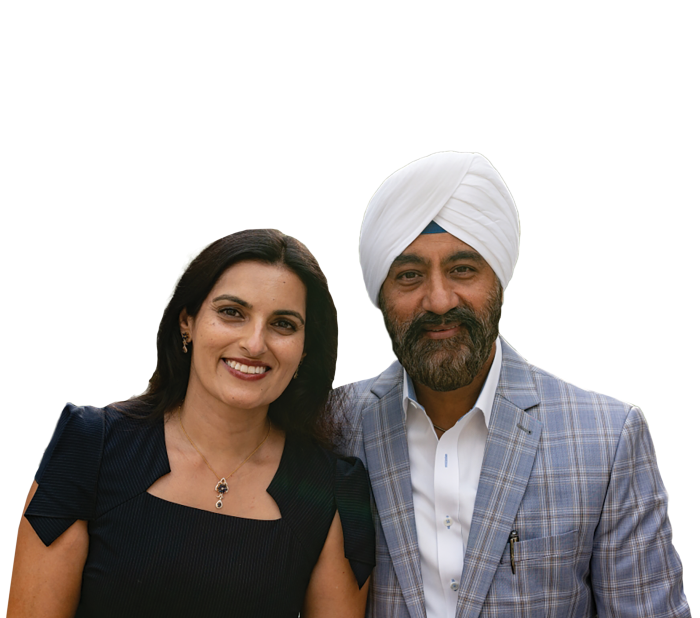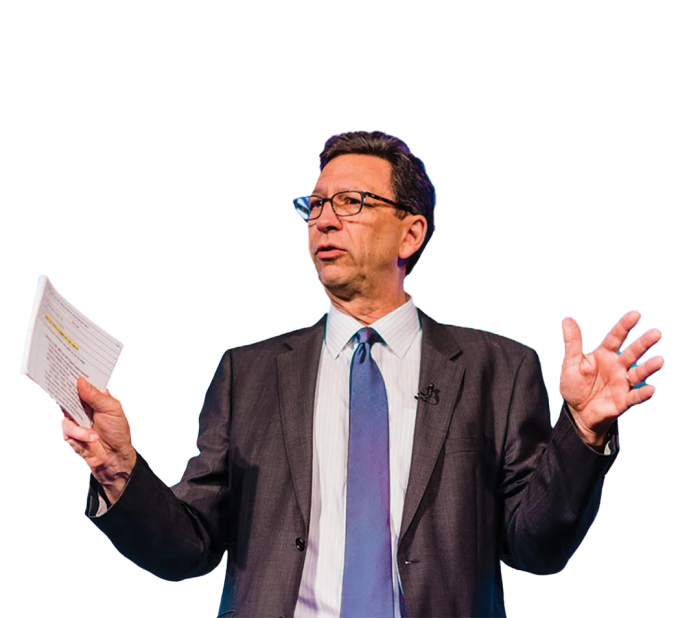The Impact of Philanthropy
Major gifts will revitalize GWSB infrastructure, create a new Seva Teaching Kitchen, help scholars in Ukraine, endow a SMHS professorship, and kick off a new SMPA conversation series to promote civil discourse. Read more about how donors are furthering academic excellence at GW and helping the university achieve its mission of teaching, research, patient care and service.
“The Duquès family’s latest gift will dramatically elevate the teaching and learning experience with capital infrastructure quality that is commensurate with GWSB’s global brand.”
GWSB Dean Anuj Mehrotra
Duquès Family to Revitalize GWSB
Infrastructure with $2.5M Gift
Alumni couple’s generosity will fund game-changing technological upgrades and physical enhancements.
Soulmates who found each other at Foggy Bottom, Henry “Ric” Duquès, B.B.A. ’65, M.B.A. ’69, and Dr. Dawn Brill Duquès, B.A. ’69, began their lifelong love for each other—and the university—on campus. Married mere days after graduation 57 years ago, today they are among the George Washington University’s most influential alumni families.
While making their mark in financial services, the field of education, the hospitality industry, GW and more, they have given generously of time and treasure to strengthen their alma mater and their family’s affiliation has grown. Ric Duquès is a GW trustee emeritus and a Monumental Alumnus, and two of the Duquès’ children—David, B.B.A. ’97, and Tiffany, B.B.A. ’02—are alumni, with the third generation now considering joining the Buff and Blue tradition.
Their most recent gift, of $2.5 million, will fund game-changing technological upgrades and physical enhancements at the GW School of Business building bearing their name, Ric and Dawn Duquès Hall. The family’s previous $5 million gift, announced to a standing ovation at Tiffany’s 2002 commencement, funded the initial construction that allowed GWSB to relocate from its former home in the Hall of Government.
Now their philanthropy will expand and provide state-of-the-art updates to the instructional design studio, transform the reach of two global classrooms, and upgrade the entrance foyer into a welcoming mini lobby for networking or simply relaxing between classes. The enhancements are slated for completion in fall 2023.
“The modernization will ensure that the business school’s facility mirrors our stellar academic offerings and catalyzes inspiration and innovation,” said GWSB Dean Anuj Mehrotra. “The Duquès family’s latest gift will dramatically elevate the teaching and learning experience with capital infrastructure quality that is commensurate with GWSB’s global brand.”
New Seva Teaching Kitchen Fund Expands GW’s Culinary Medicine Program
Generous gift from former medical resident and professor will promote health through better nutrition at Foggy Bottom teaching kitchen space.
Every day in the nearly 20 years she practiced medicine at the George Washington University’s School of Medicine and Health Sciences, Seema Kakar saw the impact of unhealthy eating in her patients living with diabetes, high blood pressure, kidney disease and other chronic diseases.
Once she learned about an innovative curriculum on the new discipline of culinary medicine, an evidence-based field that blends food and cooking with clinical medicine as a tool to treat and prevent disease, Kakar was determined to share these knowledge and skills with future physicians. She launched culinary medicine education at SMHS in 2017, renting teaching kitchen space and teaching the “Health meets Food” curriculum.
Kakar and her husband, Sonny, recently established the Seva Culinary Medicine Teaching Kitchen Fund, creating the Seva Teaching Kitchen, a new learning space for GW. The teaching kitchen will occupy a former restaurant space on K Street until it moves into permanent space on the Foggy Bottom campus.
In addition to serving as a research laboratory on culinary medicine’s impact, the Seva Teaching Kitchen will host in-person and virtual immersive hands-on cooking classes for students, staff, faculty and patients. Participants will learn basic cooking skills, nutrition information and recipe knowledge that builds a firm foundation for eating delicious food that is also great for their health.
“Learning healthy cooking and eating and encouraging our patients to do so serves everyone,” said Seema, who will also serve on the kitchen’s advisory board. “I believe the Seva Teaching Kitchen will be a unique resource that is a source of pride for GW and our community.”
“I believe the Seva Teaching Kitchen will be a unique resource that is a source of pride for GW and our community.”
Seema Kakar
“Just as GW has played a significant role in our family’s success, it’s wonderful to pay it forward through this professorship and invest in others who will also experience the benefit of a GW education.”
Jonathan “Jon” B. Perlin, M.D., Ph.D.
Endowed Professorship Celebrates Family’s
100-Year GW History
Couple’s gift endows The Seymour and Ruth Perlin Professorship in
Psychiatry and Behavioral Sciences.
For more than a century and over four generations, their family has been a part of the George Washington University. This year, Jonathan “Jon” B. Perlin and Donna J. Perlin found a way to celebrate the couple at the very center of that long history.
The Seymour and Ruth Perlin Professorship in Psychiatry and Behavioral Sciences fund they endowed at GW’s School of Medicine and Health Sciences honors Jon’s parents and supports an up-and-coming faculty member in psychiatry who shares SMHS Professor Emeritus Seymour Perlin’s passion for training residents in the field.
“We wanted to recognize my parents, their contributions and their love for GW,” Jon said. “Just as GW has played a significant role in our family’s success, it’s wonderful to pay it forward through this professorship and invest in others who will also experience the benefit of a GW education.”
Jon’s father, Seymour or “Sy,” was a professor of psychiatry and director of GW’s psychiatry residency program at SMHS from 1977 to 1998. Both Sy and Ruth are founding members of the Friends of the Luther W. Brady Art Gallery. Ruth, an art historian and museum educator, also serves as a member of the George Washington University Museum and The Textile Museum board.
The family’s affiliation with GW began more than 100 years ago when Ruth’s father began his law studies at GW in 1921, earning a law degree in 1924. Rome Hall is named after Ruth’s cousin, local construction legend Benjamin Rome. Sy joined GW’s clinical faculty in 1974, and two of their sons—Jon’s brothers—earned graduate degrees from GW. This fall, a fourth generation came to GW when grandson Connor began medical school.
New SMPA Conversation Series Aims
to Promote Civil Discourse
The Frank Sesno Newsmaker Conversation Series, supported by alumni Ted Segal and Meredith Perla Segal, will showcase leading voices in politics and culture.
Ted Segal, B.A. ’03, and Meredith Perla Segal, B.Accy. ’05, created an endowed fund honoring former School of Media and Public Affairs director Frank Sesno through an annual conversation series designed as a platform for enhanced civil discourse. With the political arena increasingly defined by rancorous partisan divides, the series’ goal is to promote public understanding and enrich student experiences at GW.
“If we can do a small part to broaden the perspectives of our audience, to elevate the dialogue, it will be of great service to our GW community, to the D.C. community and to the national conversation,” said Ted Segal, founder and president of the EJS Group, a real estate development and financing company. The Segals are longtime supporters of numerous GW initiatives as well as other causes including Type 1 diabetes research, food insecurity and veteran service organizations. They proposed the series in honor of Sesno’s more than three decades in journalism and his 11 years of service as SMPA director. Through the series, which will examine trends in media, highlight compelling public figures and provide insightful analysis of current events, they hope to expose students throughout the university to thought-provoking, respectful conversations across political and cultural spectrums.
“I am honored beyond words by this remarkable gift and the series it will support,” said Sesno, who currently serves as SMPA director of strategic initiatives. Throughout each conversation, “we will explore the ideas that shape our world. We’ll probe the opportunities and challenges confronting our democracy. We’ll ask tough questions in pursuit of edifying, fact-based civil discourse. This is what GW stands for.”
“If we can do a small part to broaden the perspectives of our audience, to elevate the dialogue, it will be of great service to our GW community.”
Ted Segal, founder and president, the EJS GrouP
“The best we can do [now] is to support educated societies. An educated refugee is invaluable to this goal.”
Jenna Segal, B.A. ’98
Alumna Jenna Segal Establishes Fund
to Help Scholars in Ukraine
Generous gift will bring visiting fellows to GW and support others abroad.
Just three weeks after Russian troops invaded Ukraine, Tony Award-winning producer Jenna Segal, B.A. ’98, and her husband, Paul, approached the George Washington University’s Elliott School of International Affairs to offer immediate assistance to scholars under fire in Ukraine.
These scholars, many of whom have fled their homes, have important stories to tell, said Segal, whose gift establishes the Fund for Scholars Affected by the War in Ukraine. “The Dark Ages were the downfall of educated societies,” she said. “The best we can do [now] is to support educated societies. An educated refugee is invaluable to this goal.”
Run by GW’s Institute for European, Russian and Eurasian Studies, the Segals’ innovative gift creates two different avenues for support. Each semester for five years, the Elliott School will welcome three visiting fellows to campus. In addition, 10 Ukraine-based scholars each year will receive annual stipends to allow them to continue their work either in parts of Ukraine at a distance from the violence or in neighboring countries.
Donna Arbide, GW’s vice president for development and alumni relations, said the Segals’ gift “is a shining example of the power of philanthropy to improve people’s lives.”
“We all read the news of this horrifying situation and wish we could help, and the Segals took the initiative to show us how individuals can change the world one life at a time,” Arbide said. “Their incredible generosity enables the Elliott School to meet a truly urgent need to keep learning alive at a critical time in world history.”







